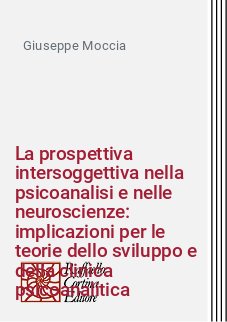Ebook in formato Pdf leggibile su questi device:
-
Android
-
E-Book Reader
-
Ibs Tolino
-
Kobo

| Rivista | La Rivista di Psicoanalisi |
| Fascicolo | Rivista di Psicoanalisi 2020/2 |
| Titolo | La prospettiva intersoggettiva nella psicoanalisi e nelle neuroscienze: implicazioni per le teorie dello sviluppo e della clinica psicoanalitica |
| Autore | Giuseppe Moccia |
| Editore | Raffaello Cortina Editore |
| Formato |
|
| Pagine | |
| Online da | 06-2020 |
| Doi | DOI10.26364/RPSA20200660409 |
La prospettiva intersoggettiva nella psicoanalisi e nelle neuroscienze: implicazioni per le teorie dello sviluppo e della clinica psicoanalitica
L’Autore passa in rassegna alcuni dei concetti relazionali intervenuti nelle ultime decadi nella teoria dello sviluppo e della situazione psicoanalitica. Significative sono le attuali evoluzioni teoriche relative ad una capacita di interazione precoce del neonato e agli sviluppi dei concetti di controtransfert, identificazione proiettiva ed enactment. Egli sostiene che a questa integrazione delle concezioni intersoggettive abbiano contribuito anche le corrispondenti scoperte empiriche provenienti dal campo delle scienze affini attraverso una influenza indiretta sulla ricerca concettuale nel campo psicoanalitico, promuovendo una maggiore sensibilità rispetto alla compatibilità e accettabilità dei concetti alla luce delle scoperte scientifiche. In proposito ritiene significativi soprattutto i contributi neuroscientifici sul tema delle memorie, dell’affetto e della percezione inconscia.
Parole-chiave: Empatia, enactment, eterogeneità della rappresentazioni mnestiche, identificazione proiettiva, influenza indiretta, intersoggettività, neuroscienze, percezione inconscia, ricerche sull’infanzia, simulazione incarnata, teoria degli affetti, teorie dello sviluppo.
The intersubjective perspective in psychoanalysis and neuroscience: implications for developmental theories and the psychoanalytic clinic. The Author reviews some of the relational concepts that have intervened in the last decades in the theory of development and psychoanalytic situation. Significant are the current theoretical evolutions related to a newborn’s ability to interact at an early stage and to the developments of the concepts of countertransference, projective identification and enactment. He argues that the corresponding empirical findings from the field of related sciences have also contributed to this integration of intersubjective conceptions through an indirect influence on conceptual research in the psychoanalytic field, promoting a greater sensitivity to the compatibility and acceptability of concepts in the light of scientific findings. In this regard, the neuroscientific contributions on the subject of memories, affection and unconscious perception are particularly significant.
Key words: Empathy, enactment, heterogeneity of mnestic representations, projective identification, indirect influence, intersubjectivity, neuroscience, unconscious perception, research on childhood, embodied simulation, theory of affections, developmental theories.
La perspective intersubjective en psychanalyse et neurosciences: implications pour les théories du développement et la clinique psychanalytique. L’auteur passe en revue certains des concepts relationnels qui sont intervenus au cours des dernières décennies dans la théorie du développement et la situation psychanalytique. Les évolutions théoriques actuelles concernant la capacité d’interaction précoce d’un nourrisson et le développement des concepts de contre-transfert, d’identification projective et de mise en acte sont significatives. Il soutient qu’à cette intégration des conceptions intersubjectives ont également contribué les correspondantes découvertes empiriques sorties dans le domaine des sciences connexes, par une influence indirecte sur la recherche conceptuelle dans le domaine psychanalytique, favorisant une plus grande sensibilité en ce qui concerne la compatibilité et l’acceptabilité des concepts à la lumière des découvertes scientifiques. À cet égard, il estime que les contributions neuroscientifiques sur le thème des mémoires, de l’affection et de la perception inconsciente sont importantes.
Mots clés: Empathie, hétérogénéité des représentations mnémoniques, identification projective, influence indirecte, intersubjectivité, mise en acte, neurosciences, perception inconsciente, recherche sur l’enfance, simulation incarnée, théorie de l’affect, théories du développement.
La perspectiva intersubjetiva en el psicoanálisis y en la neurociencia: implicaciones en la teoría del desarrollo y de la clínica psicoanalítica. El autor revisa algunos de los conceptos relacionales presentes en las últimas décadas en la teoría del desarrollo y de la situación psicoanalítica. Son significativas las evoluciones teóricas actuales relacionadas con la capacidad de interacción temprana del bebé y con el desarrollo de los conceptos de contratransferencia, identificación proyectiva y enactment. El autor considera que a esta integración de conceptos intersubjetivos hayan colaborado el desarrollo empírico proveniente del campo de ciencias afines gracias a la influencia indirecta che han tenido en la investigación conceptual en el campo psicoanalítico, promoviendo una mayor sensibilidad con respecto a la compatibilidad y aceptabilidad de los conceptos a la luz de los descubrimientos científicos. En este sentido, el autor considera significativos los aportes neurocientíficos sobre temas como memoria, afecto y percepción inconsciente.
Palabras clave: Empatía, heterogeneidad de representaciones mnesticas, identificación proyectiva, influencia indirecta, intersubjetividad, investigación sobre la infancia, neurociencia, percepción inconsciente, representación, simulación encarnada, teoría del afecto, teorías del desarrollo.
Die intersubjektive Perspektive in der Psychoanalyse und in den Neurowissenschaften: Implikationen für die Theorien der Entwicklung und der psychoanalytischen Praxis. Der Verfasser geht auf einige relationale Konzepte ein, die in den letzten Jahrzehnten in der Theorie der Entwicklung und der psychoanalytischen Situation eingebracht worden sind. Bedeutsam sind die aktuellen theoretischen Entwicklungen bezüglich einer frühzeitigen Interaktionsfähigkeit des Neugeborenen und bezüglich der Entwicklungen der Konzepte von Gegenübertragung, projektiver Identifikation und Enactment. Der Verfasser vertritt die Ansicht, dass zu dieser Integration der intersubjektiven Konzeptionen durch einen indirekten Einfluss auf die konzeptuelle Forschung im psychoanalytischen Bereich auch die korrespondierenden empirischen Entdeckungen beigetagen haben, die dem Bereich der verwandten Wissenschaften entstammen, und so eine größere Sensibilität in Bezug auf die Kompatibilität und die Akzeptabilität der Konzepte im Lichte der wissenschaftlichen Entdeckungen gefördert wird. In dieser Hinsicht hält er besonders die neurowissenschaftlichen Beiträge zum Thema der Erinnerungen, des Affekts und der unbewussten Wahrnehmung für bedeutsam.
Schlüsselwörter: Empathie, Enactment, Heterogenität der Gedächtnisrepräsentationen, indirekter Einfluss, Intersubjektivität, Kindheitsforschung, Neurowissenschaften, projektive Identifikation, unbewusste Wahrnehmung, Theorie der Affekte, Theorie der Entwicklung, verkörperte Simulation.